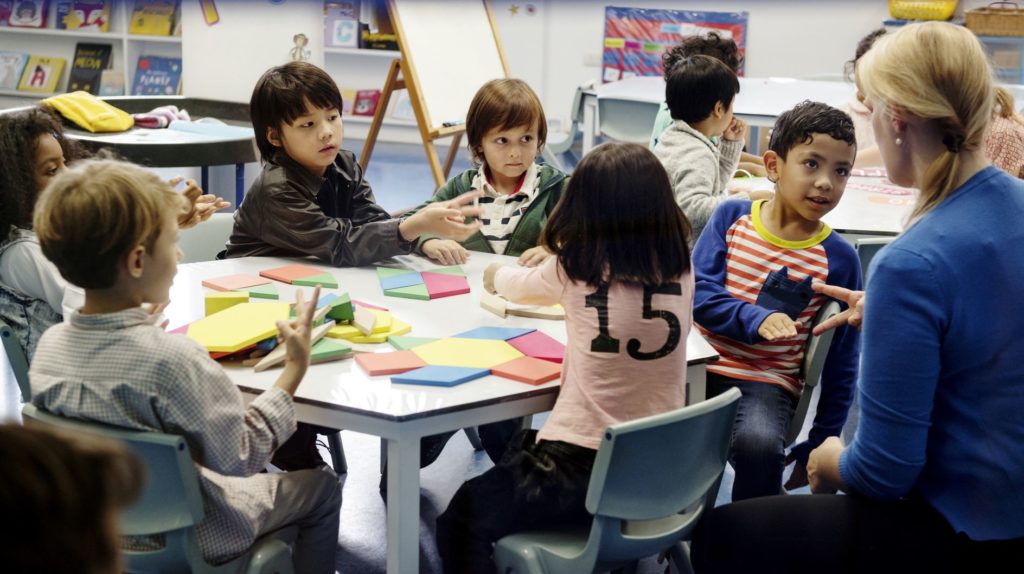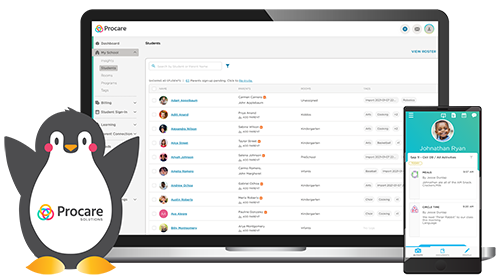
This blog was originally published on March 21, 2021, and updated on November 13, 2024, with new information. Clearly defining your child care philosophy into a set of guiding principles is an excellent way to set your center apart and improve your operations. By defining a philosophy, you can establish the character and values of your center and communicate that character to parents.
Let’s talk about the meaning of child care philosophy, why it matters to your center, and how you can establish your own child care philosophy statement.
We’ll also introduce five well-known child care philosophies you can consider at your center.
What is a Child Care Philosophy?
A child care philosophy is a statement of your center’s goals, beliefs and values about the nature of child development, the role of child care, and the methods and goals of education. As a set of principles guiding your center, it is broad and comprehensive, covering every aspect of child care.
A good child care philosophy is rooted in a model of child development and points to the objectives of the center and its curriculum.
It defines your center’s purpose, its role in the life of the child and its relationship to the community.
Why is a Child Care Philosophy Important?
Every child care center holds the mission of nurturing children’s potential. But in the classroom, it’s not always obvious what choices will help children learn and grow. Establishing a child care philosophy simplifies decision-making by clarifying your center’s beliefs and priorities in education.
With a child care philosophy in place, all decisions, from broad strategies like curriculum models, to interactions with individual children, can be made with reference to your center’s principles.
Crucially, a child care philosophy helps you communicate your child care approach to parents. This reduces misunderstandings and builds trust, since parents can rely on you to act in accordance with the philosophy you present.
5 Child Care Philosophies You Should Know

To help define the philosophy of your center, it can be useful to understand existing child care philosophies. Studying the five child care philosophies described here may provide inspiration for your own philosophy statement and help you identify the values that define your child care business.
Developmental Child Care
The most common philosophy of child care in the United States, developmental child care, combines insights from various child care approaches into a philosophy that nurtures every developmental sphere, according to Columbia University. It holds a constructivist view of learning, integrating child-directed and hands-on activities with teacher-led learning, direct instruction and technology.
In this model, children develop physically, cognitively, socially and emotionally through play-based learning, and teaching is primarily conducted interactively. The role of the teacher is to be a secure and supportive mentor and form an empathetic connection with the child, guiding them to their potential and setting healthy limits. Classrooms are homelike and comfortable environments where children are safe and free to explore.
The Development-Interaction Approach (The Bank Street Method)
The Bank Street Method, also known as the Development-Interaction Approach to preschool, is descended from the progressive educational theories of John Dewey. It is a child-directed model of learning that prioritizes the freedom of the child and the expertise of the teacher in pedagogy.
Teaching any specific content is de-emphasized. Instead, teachers observe children’s activities to guide children to success and find spontaneous learning opportunities. With children’s natural interests as a starting point, children can learn how to learn while exploring the things that they care about.
Self-Directed Discovery (The Montessori Method)
The Montessori Method was developed by Italian physician Maria Montessori, one of the first educators to develop a constructivist model of child development. She recognized that children do not learn passively, through direct instruction, but rather actively, through exploring the world.
Her child care philosophy stresses that children should have a high degree of independence within a structured environment. It is through the creation of an ordered environment, rather than through instruction, that educators can help guide children’s learning. It’s believed that time devoted to the Montessori classroom activities will help children develop focus, discipline, independence and a love of learning.
Procare has pre-loaded the Montessori standards, which focus on all areas of child development – cognitive, emotional, social and physical. To learn more about Montessori standards, visit the Montessori Foundation.
The Self-Directed-Developmental Approach (Reggio Emilia Pedagogy)
Influenced by Montessori, the Reggio Emilia approach to pedagogy is a self-directed model of learning that emphasizes self-expression and collaboration. In this philosophy, children have the right to develop their own potential according to their preferences and ideas.
The Reggio Emilia model looks at the child as an apprentice to the teacher and the teacher as a co-learner with the child, especially by working on long-term projects. Teachers are encouraged to participate in the same activities as children, asking questions and guiding kids toward learning.
Play-based Learning (The Waldorf Approach)
Waldorf education is based on the educational philosophy of Rudolf Steiner, a German philosopher and educator. A holistic approach with a strong focus on imagination and freedom and a rejection of grades and tests, individual Waldorf schools differ widely in their curriculum but are united by their embrace of play-based learning and experiential education.
Waldorf educators believe that children have a natural tendency to play, and that play is the child’s primary way of relating to the world. That play, however, is done within a structured weekly routine of games and activities. “Active learning” is taken literally in the Waldorf approach, and the use of technology like computers and tablets is discouraged, since it’s seen as promoting passivity.
How to Define Your Child Care Philosophy

Write Down Your Child Care Beliefs
As an educator, it’s probable that you have opinions or subscribe to one or more schools of thought concerning child development. Take some time to go over those ideas by yourself or with fellow staff, writing down your understanding of how kids grow and learn, and what they need most to help them reach their full potential.
Examples of questions that can help you define your beliefs in child care are:
- Should learning primarily be child-led or teacher-led?
- What is the role of play and socialization?
- Do children learn better in small or large groups?
- What kind of assessments should be done on children’s learning?
Consider Child Care Values in Your Community
When it comes to defining the goals and values of your center, your thoughts as an educator take a leading role, but all stakeholders should be involved. Keep the values of your center’s community in mind and engage with parents to find out what they want and expect from your center.
Actively seeking parents’ input will open your center to new ideas and help you build rapport with families. Ultimately, you and families both want their kids to be happy, healthy and well-prepared for school, so knowing how parents feel about the role of child care should be a key part of the process.
Envision Roles and Expectations for Kids, Parents and Providers
Your child care philosophy will help you understand what part everyone must play in education. Consider whether staff will be primarily responsible for leading activities, or will act as observers and guides. How will the unique learning style of each child be accommodated, and what are the goals for each child’s education?
It’s also important to consider how you can serve the needs of parents and how they contribute to your center. Depending on your community, serving parent needs may include acknowledgement of cultural diversity or accommodation of family structures and routines. Parents can contribute by preparing their children for child care, cooperating with the goals of the center and participating in the child care community.
Set Priorities for Your Curriculum & Learning Environment
Depending on your beliefs about child care, how each child learns and what prepares children best for the future, you’ll be able to establish the goals of your child care curriculum and learning environment.
If your philosophy is more academic, you may prefer a structured curriculum, but if it’s more play-based, you’ll want to focus on child-led education These differences will be reflected in your lesson plans. The environment you set up will be oriented around the goals of your curriculum and its key learning activities. For example, if your philosophy is grounded in the Montessori approach, you’ll want to include Montessori’s sensory learning materials in each room.
Draft Your Child Care Philosophy
Now that you’ve thought about the goals of your center, it’s time to write down your child care philosophy.
Explain your beliefs, goals, values and commitments: what your center provides, the expectations of staff and children, the role of parents, and the outcomes you hope to achieve for each child.
Once you’re finished, you can share your philosophy and values with members of your child care community. You may also want to review and rethink your philosophy every six to12 months to clarify and strengthen your principles while reflecting the growth of your center.
Bring Your Child Care Philosophy to Life with Procare Solutions

A child care philosophy isn’t just a piece of paper, it’s a way of life for your entire center. Every day at your child care center should be guided by the beliefs and values you uphold. With Procare, it’s easier than ever to plan lessons that reflect your educational values.
Staying aligned with early learning frameworks is easy through Procare’s pre-loaded standards for all 50 states. Procare sources the most up-to-date standards by state to ensure you can leverage accurate and timely resources. ECEs can apply state early learning standards to lesson plans to ensure each domain that is covered in the classroom can be recorded as observations, enabling early learning providers to track specific events that contribute to a child’s development against a standard. Compile reports on each student’s development to easily see their progress and share with parents.
Have proprietary learning standards that aren’t included in your state’s guidelines? Use Procare’s customizable learning frameworks to input your domains, sub-domains and milestones, all of which can be assigned to ages or categories!
ECEs that adopt the Montessori standard can use integrated lesson plans to ensure each domain that is covered in the classroom can be recorded as observations, enabling early learning providers to track specific events that contribute to a child’s development against a standard. Compile reports on each student’s development to easily see their progress and share with parents. Procare enables the ability to include proprietary learning standards as well.
Ready to find out how you can effortlessly plan lessons around your child care philosophy?





